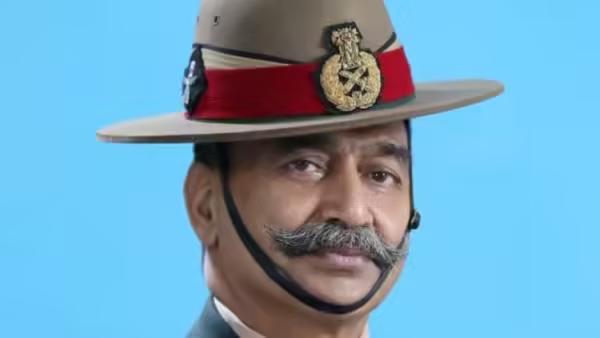
NEW DELHI: According to a former Director General of Military Operations who managed the Doklam crisis, Operation Sindoor has highlighted the significance of drones in contemporary warfare, which, together with space and cyberspace, will shape the new paradigm of future military engagements.

In a Thursday interview with PTI Videos, retired Lt. Gen. Anil Kumar Bhatt also voiced his disapproval of social media recommendations made by several war-mongers who were upset that the fighting would finish in four days and said it was a chance to retake Pakistan-occupied Kashmir.
He said that because India has accomplished its strategic objectives, war should be avoided and should only be used as a last resort.
“Let me tell you, a war or the reoccupation of Pakistan-occupied Kashmir should be a decision-driven conflict. This time, it was not the plan.
Indeed, if the increasing ladder led you there, the Indian military was ready for it,” Bhatt, who is leading the expansion of the nation’s commercial space technology industry upon his retirement in June 2020, said.
One of the highest ranking military leaders in the organization, Bhatt served as DGMO and was responsible for maintaining the armed forces’ operational readiness at all times.
In addition to cooperating with the other two services and civilian and paramilitary security forces, the DGMO, who reports directly to the army commander, plays a crucial role in developing plans to address both short-term and long-term security concerns.
The DGMO is responsible for communicating with his opposite number at times of crisis and heightened tensions.
Lt Gen Rajiv Ghai is the DGMO at the moment.
When India and China were engaged in a 73-day military stalemate in the Doklam tri-junction close to the Sikkim section of the Line of Actual Control (LAC) in 2017, Bhatt served as DGMO.
The army’s second-highest rank, behind a five-star general, is a four-star lieutenant general.
For the most part, a field marshal is a ceremonial or wartime position.
“I would thus advise all of my compatriots that war is a serious matter. An really severe matter.
And a country pursues it when all other choices have been exhausted.
Bhatt, who served in the Army for 38 years, said, “We gave a sense to it and had options less than war (during the current crisis).”
When asked how significant drones were in the most recent conflict, he responded that they had established a completely new paradigm in warfare and that the world’s militaries had started to pay attention to them after Azerbaijan’s remarkable victory over a well-armed Armenia in a war that was all but lost.
The drones were manufactured in Turkey.
Pakistan also received drones from Turkey, and it used them to fly swarms over Indian airspace with sometimes deadly payloads and for observation.
Bhatt concurred that during the two Azerbaijan-Armenia conflicts in 2017 and 2020, comparatively cheap drones that cost as low as Rs 2 lakh were able to destroy armored tanks valued at Rs 20–30 crore.
This demonstrated that drones would be common in future battle zones. Bhatt pointed out that there are two more new components to it.
“We used to say that battles are fought in the air, on land, and at sea. However, two new domains—’space and cyber space’—are already forming, and they are very significant and effective,” Bhatt said.
He now serves as the director general of the Indian Space Association, which is the space industry’s trade association.
According to Bhatt, the space industry is essential to future conflict because, in addition to directing missiles and airplanes to their intended targets, satellites are crucial for intelligence collection, monitoring, and reconnaissance.
“But in the future every country will have to protect its assets in space and also know what are the adversaries’ assets in space,” he said.
According to Bhatt, a number of nations have developed anti-satellite weapons and are working on suicide satellites that approach and destroy an enemy’s satellites.
According to him, India now has nine or ten military satellites for surveillance and intends to install a constellation of fifty-two satellites for space-based monitoring.
“These fifty-two satellites will undoubtedly improve our capabilities. These days, businesses like Maxar and PlanetM, among others, fill our need. Naturally, however, we would like to have our own satellites. “Controlling the shutter is crucial,” Bhatt said.
Following a string of failures, including the 2023 assault on the mansion of the Pakistan Corps Commander by supporters of former Prime Minister Imran Khan, he stated the Pahalgam strike was seen in strategic circles as an effort by the Pakistan Army to remain relevant in their nation.
According to Bhatt, India has set a new red line for relations with Pakistan by threatening to retaliate violently for any act of terrorism committed on Indian territory.
“A new normal has been established. You will be struck back if you pass the red line. We will need to be better prepared, of course. However, there is no alternative approach for Pakistan,” he said.
According to Bhatt, the Indus Water Treaty’s abeyance has proven to be a highly successful strategy.
He said that another strategy was for India to continue to monitor Pakistan’s actions while concentrating on its own economic narrative.
“You have a choice. You drive your automobile after putting Pakistan on your front screen. Or keep driving it while taking a peek at the economics. It will suffice to keep Pakistan in the rearview mirror. “Don’t divert your attention from their actions,” he said.
Bhatt brought up the war assessments made by former Prime Minister Atal Bihari Vajpayee.
“Prime Minister Vajpayee once said that starting a war is extremely simple. But stopping it is very difficult. And it provided a great deal of clarity.
The difficulty with war is being able to put an end to it. Second, do you accomplish your battle objectives and at what cost?” he said.
According to the former army general, this does not imply that a country should not be war-ready.
“A battle may be avoided if you are ready for it. And we must be ready for any enemy, whether they come from the north or the west. And the goal of the preparedness is to avoid conflict,” Bhatt said.
Bhatt also mentioned Israel, stating that its name is often used in India as an example.
“Israel and a nation are engaged in an asymmetric conflict. No nation exists. An army does not exist. On the opposite side, there are no nuclear weapons. We must acknowledge that we are against an enemy with a sizable force.
Furthermore, it has a very powerful supporter,” he said.
-
Mindful Eating: A Simple Way To Improve Your Health In New Year

-
World Hypertension Day: Tanav, Smoking Tasch Madhyapanamu 25% Tarunamadhyay Hy Rakt Dababachi problem, 10 packed 8 genius

-
JEFF Bezos now monitors India after Elon Musc! The big change in the telecom market, the new satellite internet service will start soon

-
49ers Extend QB Brock Purdy for Five Years

-
Indian women’s ODI and T20 team announced for England tour, BCCI announced | Read
